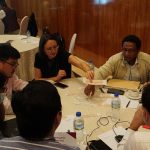At C4ED, we are committed to an evidence-based, transparent, and accountable approach to development. We understand that in order to achieve development goals and improve the living conditions of communities in affected regions, it is essential to integrate findings from impact evaluations into the strategic management of programs and projects. With a scientific background, our team at C4ED approaches our work with a holistic and integrated mindset, bridging the gap between research and action. Our two-pronged strategy sees us conduct independent and rigorous evaluations for clients, aiming to understand the impact of development programs and providing sound advice. Additionally, we run our own projects in Ethiopia and Pakistan, combining the latest research methods and technologies with the rich implementation experience of our local partners to ensure quality and reliability.
We operate from an intermediary perspective, bringing together investment and local expertise on the ground and accompanying them with integrated evaluation methodologies. This approach allows us to make development cooperation more effective and efficient. We are proud to be a trusted partner to organizations around the globe and look forward to continuing our efforts to create a more equitable and sustainable future.
Our Two Pillars in Action
Bridging the gap between science and expertise
At C4ED, we operate from an intermediary perspective to bring together investment and expertise. Our goal is to design, coordinate, manage, supervise, and successfully implement a philanthropic pilot project at scale and in a sustainable manner. This project is accompanied by a scientific evaluation approach to indicate what measures, when, for whom and under which circumstances work.
Project Portfolio
With our project portfolio on poverty, hunger and climate change adaptation with all its sub-themes, we offer smart development solutions to bring people in need into a socio-economically stable situation. Through the broad project portfolio, we can offer a variety of innovative project investment opportunities to the donors and philanthropists.
Our project cycle is continuously supported through LEAP (Learning, Evaluating and Planning) activities. We specifically select projects that are replicable and offer long-term scaling-up potential, taking into account local conditions. Local implementation expertise and scientific expertise go hand in hand as early as the project design stage. Results of previous evaluations of what works, for whom, under what conditions are already incorporated into the project design. In order to take into account the complexity of the development policy context, we strive to maximize synergy effects and examine the linkage effects of the projects, because our goal is maximum complementarity of the subprojects.
Implementing Partners
Our local implementing organizations as key stakeholders submit project proposals to us via a standardized Partnership Proposal Document. This is comprehensively checked for the intended objectives and their sustainable impact, evaluated and then selected taking into account the linkage effects and synergies in the overall project context.
Project Controlling and Quality Assurance
C4ED commits to accompany the project throughout all project phases with an appropriate scientific evaluation approach. This has the advantage that early intervention is possible as soon as the results indicate that intended effects are not achieved or non-intended effects occur. Our scientific staff with many years of experience in the implementation of monitoring and evaluations also guarantee quality assurance of the monitoring methods accompanying the project.
Providing a wide array of tailored and high-quality services
C4ED specializes in conducting impact evaluations using Randomized Controlled Trials (RCTs) and quasi-experimental evaluation methods in more than 60 countries in the fields of agriculture, climate resilience, education, entrepreneurship, gender, health, labor, microfinance, nutrition, poverty reduction, and rural development. Through this rigorous research and evidence-based policy analysis, C4ED develops and promotes innovative development solutions to combat poverty and improve the livelihoods of the world’s vulnerable populations. C4ED provides a wide array of analyses and services that are tailored to address clients’ specific needs in international development, and implement assignments in an ethical, inclusive, gender-responsive, context-oriented manner.
Our Services
Data collection
 C4ED has a strong track-record in collecting qualitative and quantitative data, owing to its expertise in terms of methodology and data quality control, access to modern technology, and large network of local experts and partners. Depending on the needs of the clients and feasibility, we conduct e.g. longitudinal, multi-wave, as well as cross-sectional data collection and randomized controlled trials. We triangulate and validate results to counterbalance any methodological flaws and to provide a holistic analysis and results using mixed-methods. We are well equipped to conduct primary data collection through e.g. household, monitoring, validation, and diagnostic surveys; in-depth and key informant interviews; and focus group discussions. To do so, we provide trainings to enumerators to monitor and enhance the quality of data collected. We also retrieve data from secondary sources from various local and global platforms. Our skillful use of modern technology and connections to extensive local networks enable us to collect data from remote areas, as well as in volatile, conflict and/or disaster-affected countries and regions.
C4ED has a strong track-record in collecting qualitative and quantitative data, owing to its expertise in terms of methodology and data quality control, access to modern technology, and large network of local experts and partners. Depending on the needs of the clients and feasibility, we conduct e.g. longitudinal, multi-wave, as well as cross-sectional data collection and randomized controlled trials. We triangulate and validate results to counterbalance any methodological flaws and to provide a holistic analysis and results using mixed-methods. We are well equipped to conduct primary data collection through e.g. household, monitoring, validation, and diagnostic surveys; in-depth and key informant interviews; and focus group discussions. To do so, we provide trainings to enumerators to monitor and enhance the quality of data collected. We also retrieve data from secondary sources from various local and global platforms. Our skillful use of modern technology and connections to extensive local networks enable us to collect data from remote areas, as well as in volatile, conflict and/or disaster-affected countries and regions.
Monitoring and Evaluation
 Monitoring and evaluation (M&E) is a critical tool to consolidate evidence, accountability, and to reinforce organizational learning, and ensure maximum social impact of development projects. C4ED offers technical assistance in designing and executing M&E assignments to multiple international clients. Our team of M&E specialists work closely with clients to develop an M&E system that serves the client’s envisioned expectations and goals. C4ED supports in the development of monitoring strategies, monitoring tools, data collection approaches and data visualization and verification. We also offer capacity building and training opportunities to clients to strengthen their inhouse capacity to design and implement M&E.
Monitoring and evaluation (M&E) is a critical tool to consolidate evidence, accountability, and to reinforce organizational learning, and ensure maximum social impact of development projects. C4ED offers technical assistance in designing and executing M&E assignments to multiple international clients. Our team of M&E specialists work closely with clients to develop an M&E system that serves the client’s envisioned expectations and goals. C4ED supports in the development of monitoring strategies, monitoring tools, data collection approaches and data visualization and verification. We also offer capacity building and training opportunities to clients to strengthen their inhouse capacity to design and implement M&E.
Evaluations and Rigorous Impact Evaluations
 Impact evaluation is an assessment that provides answers to whether, to what extent, and upon which contexts do development interventions work, and helps to identify what are the intended and unintended outcomes. Impact evaluation is widely recognized as a powerful tool among a wide range of actors in the field of international development, including practitioners, policy makers, and donors.
Impact evaluation is an assessment that provides answers to whether, to what extent, and upon which contexts do development interventions work, and helps to identify what are the intended and unintended outcomes. Impact evaluation is widely recognized as a powerful tool among a wide range of actors in the field of international development, including practitioners, policy makers, and donors.
Evidencing social and economic impact of an intervention is crucial, yet it is unequivocally a difficult task. Technical and methodological expertise is a prerequisite to conduct independent and scientifically rigor impact evaluations. Given our solid inhouse capacity, C4ED spearheads implementation of data-driven impact evaluations and are well positioned to service a comprehensive and customized package to clients to measure impacts in various fields and contexts. C4ED works closely with clients to design counterfactual, experimental, and quasi-experimental evaluations, implement mixed-methods approaches, collect baseline, midline, and endline data, and run statistical, econometric, and qualitative analyses to generate evidence-based policy and practical recommendations. Where necessary, C4ED also conducts analysis on cost-effectiveness to further add on to the holistic assessment of a development intervention. In our evaluations, we follow the principles of the OECD DAC criteria to ensure the systematic and objective assessment.
Research studies
 C4ED conducts studies that do not fall under the category of (impact) evaluations, and that can be tailored to the client’s needs. In the frame of this, we offer to conduct feasibility studies, rapid assessments for development projects, systematic reviews to identify development interventions that work, as well as research to summarize and derive policy and practical implications from multiple impact evaluations, and developing user-friendly Evidence Gap Maps (EGM) that visualizes and highlights existing gaps in terms of availability of impact evaluations and/or systematic reviews. Such research and EGMs are conducted in conjunction with thorough consultations with clients and other relevant stakeholders on research questions, methodology, and end-product design to meet the needs of the clients.
C4ED conducts studies that do not fall under the category of (impact) evaluations, and that can be tailored to the client’s needs. In the frame of this, we offer to conduct feasibility studies, rapid assessments for development projects, systematic reviews to identify development interventions that work, as well as research to summarize and derive policy and practical implications from multiple impact evaluations, and developing user-friendly Evidence Gap Maps (EGM) that visualizes and highlights existing gaps in terms of availability of impact evaluations and/or systematic reviews. Such research and EGMs are conducted in conjunction with thorough consultations with clients and other relevant stakeholders on research questions, methodology, and end-product design to meet the needs of the clients.
Information systems management and knowledge management
 C4ED provides technical support to clients to consolidate and analyze knowledge on best practices. Stockpiling information and knowledge may take the form of analyzing past interventions in respect to effectiveness, relevance, efficiency, and sustainability of interventions, conducting internal and external stakeholder interviews and surveys for appraisal, and documenting commonalities of successful interventions. Through discussions with clients, C4ED ensures that such information and knowledge are formulated, packaged, and delivered in a way that is user-friendly and suits the client’s long-term needs.
C4ED provides technical support to clients to consolidate and analyze knowledge on best practices. Stockpiling information and knowledge may take the form of analyzing past interventions in respect to effectiveness, relevance, efficiency, and sustainability of interventions, conducting internal and external stakeholder interviews and surveys for appraisal, and documenting commonalities of successful interventions. Through discussions with clients, C4ED ensures that such information and knowledge are formulated, packaged, and delivered in a way that is user-friendly and suits the client’s long-term needs.
Policy recommendations and developing policy findings dissemination platforms
 In order to benefit from research results and incorporate them into programming or policy-making, C4ED hosts workshops, conferences, and events to disseminate emerging and innovative ideas and evidence-based solutions for international cooperation. C4ED has organized such events in collaboration with bilateral agencies, international organizations, as well as research institutions. These occasions provide a platform to bridge the gap and promote dialogue between policy and research.
In order to benefit from research results and incorporate them into programming or policy-making, C4ED hosts workshops, conferences, and events to disseminate emerging and innovative ideas and evidence-based solutions for international cooperation. C4ED has organized such events in collaboration with bilateral agencies, international organizations, as well as research institutions. These occasions provide a platform to bridge the gap and promote dialogue between policy and research.
Capacity building and training
 As one of our efforts to share our technical expertise and promote evidence-based policy making, C4ED provides a range of in-person or virtual capacity building and training opportunities on impact evaluations, monitoring evaluations, data collection, and econometric and statistical methods.
As one of our efforts to share our technical expertise and promote evidence-based policy making, C4ED provides a range of in-person or virtual capacity building and training opportunities on impact evaluations, monitoring evaluations, data collection, and econometric and statistical methods.

